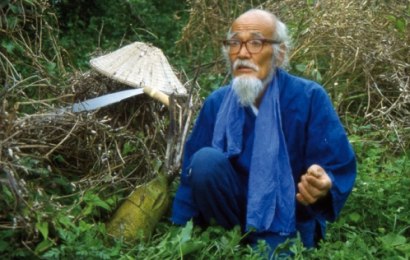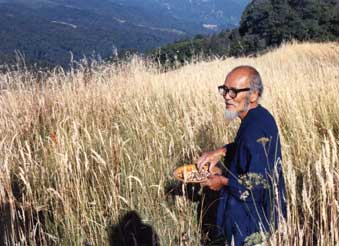
Masanobu Fukuoka's four principles
 Masanobu
Fukuoka realized that his system of natural farming wouldn't be exactly
replicable in other parts of the world --- for example, we'd be
hard-pressed to grow rice here in Virginia. So he summed up his
method into four principles that can be used anywhere.
Masanobu
Fukuoka realized that his system of natural farming wouldn't be exactly
replicable in other parts of the world --- for example, we'd be
hard-pressed to grow rice here in Virginia. So he summed up his
method into four principles that can be used anywhere.
First, he admonishes us not to
till or turn the soil. Although Fukuoka
doesn't go into the science behind the
disadvantages of soil tilling,
he did mention that cultivating soil gives troublesome weeds like
crabgrass and dock a foothold. As my father can tell you, once
crabgrass gets into your garden, you might as well move on.
 Principle 2 is "no
chemical fertilizer or prepared compost." I know the latter
may be fighting words! But I see his point ---
in nature, plant matter is naturally composted on the soil surface, a process
which promotes the growth of beneficial fungi.
Fukuoka adds fertility to his soil by returning straw (and a bit of
poultry manure) to the soil surface and keeping a groundcover of white
clover growing at all times.
Principle 2 is "no
chemical fertilizer or prepared compost." I know the latter
may be fighting words! But I see his point ---
in nature, plant matter is naturally composted on the soil surface, a process
which promotes the growth of beneficial fungi.
Fukuoka adds fertility to his soil by returning straw (and a bit of
poultry manure) to the soil surface and keeping a groundcover of white
clover growing at all times.
Third, Fukuoka refuses to
weed by tillage or herbicides.
Instead, he uses mulch, a clover groundcover, and temporary flooding
to keep the weeds in check. In addition, his winter grain/rice
rotation keeps the
fields constantly covered with crops, so weeds never have a fallow
period to gain a foothold.
Finally, principle 4 is "no
dependence on chemicals." All organic
gardeners will agree to that.
| This post is part of our One-Straw Revolution lunchtime series.
Read all of the entries: |
Want more in-depth information? Browse through our books.
Or explore more posts by date or by subject.
About us: Anna Hess and Mark Hamilton spent over a decade living self-sufficiently in the mountains of Virginia before moving north to start over from scratch in the foothills of Ohio. They've experimented with permaculture, no-till gardening, trailersteading, home-based microbusinesses and much more, writing about their adventures in both blogs and books.
Want to be notified when new comments are posted on this page? Click on the RSS button after you add a comment to subscribe to the comment feed, or simply check the box beside "email replies to me" while writing your comment.
